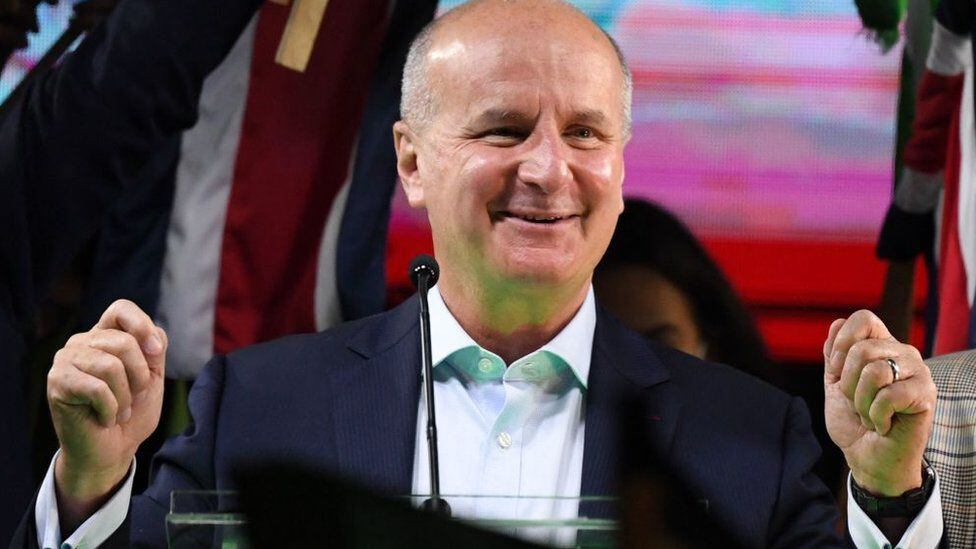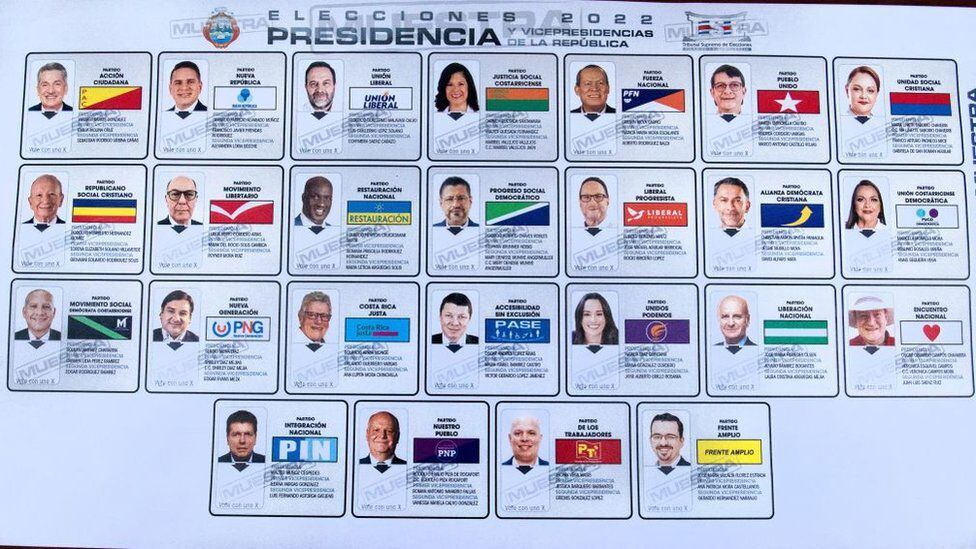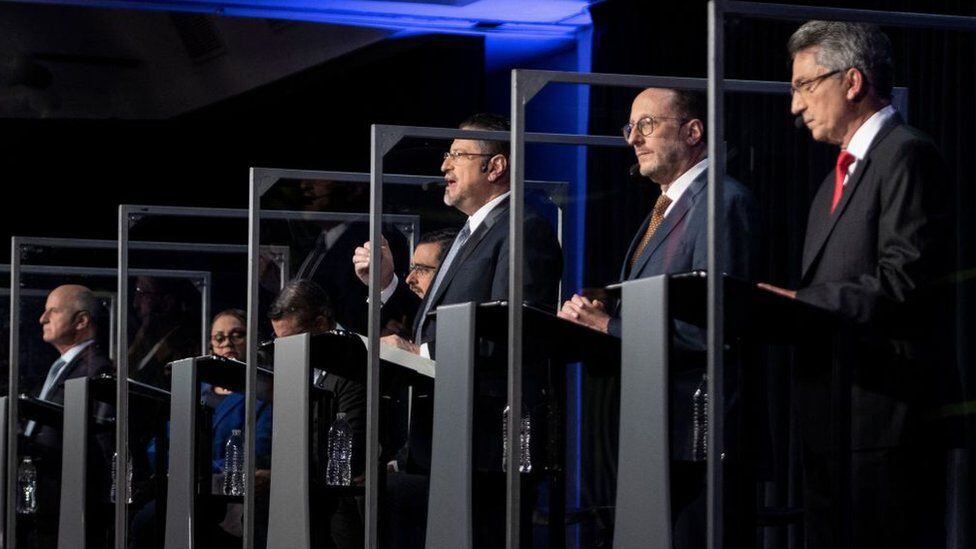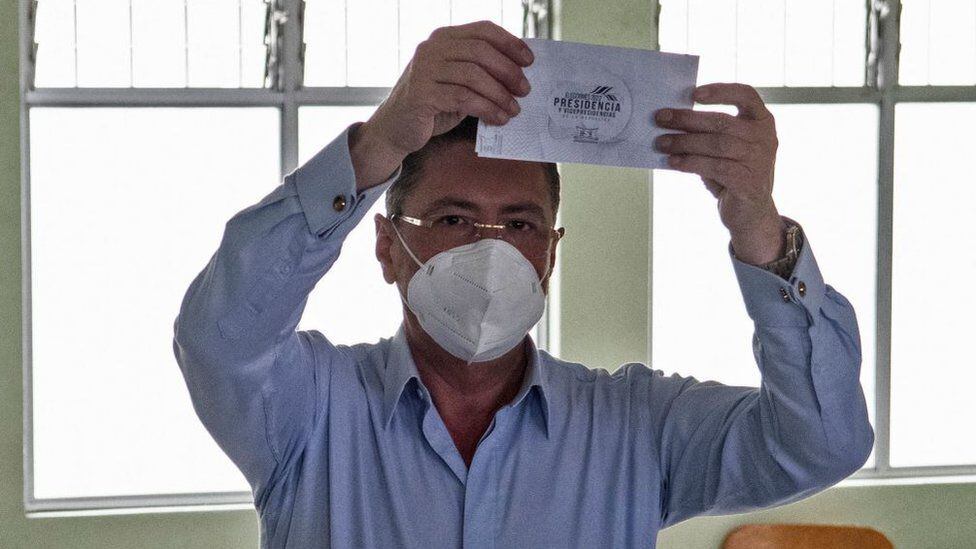The candidate of a traditional party against that of a new political formation, a politician with a long career against a career economist.
Voters will have to choose between José María Figueres, former president (1994-1998) and candidate of the historic National Liberation Party (PLN), and Rodrigo Chaves, former Minister of Finance and who competes for the Social Democratic Progress Party, created in 2018, as successor to Costa Rican President Carlos Alvarado.
LOOK: Elections in Costa Rica: former president José María Figueres and economist Rodrigo Chaves will dispute the second round
The second round of the presidential elections will be the April 3, after in the first round, held this Sunday, no candidate obtained the 40% of the votes necessary to win the position. With the count at 79%, Figueres achieved 27.4% of the votes and Chaves 16.7%.
“We are one step away from beginning the transformation of Costa Rica. We won this first round by a robust margin and that also gives us an enormous responsibility. Tomorrow we will continue the tireless work for the final victory on April 3,” Figueres told the know the results.
- “Venezuela is not a socialist country. It is a country with a capitalist still life economy”
- 3 keys that explain why Ukraine is so important for Russia
- The baby kidnapped by the Nazis for the sinister plan to cultivate the so-called “superior race”
“We are going to the second round, yes, the new party, the youngest of this campaign,” Chaves celebrated for his part.
“We are going to leave behind the riots, the conflict, the sterile confrontation, and I beg you to work together to create consensus to reorient the course of the country and relaunch the prosperity of our people, to give better living conditions to the youth. , with a promise of a better future. I invite you to that,” he added.
The elections recorded the highest abstention in 60 years, with more than 40%, and voters went to the polls to choose, in addition to the president, the two vice presidents and the 57 deputies of the Legislative Assembly for the period of 2022-2026.
These are the two candidates from which Costa Ricans will now have to choose their president.
Jose Maria Figueres
Coming from a family of politicians, Figueres, 67, is running for president again after a long stay abroad.
Whoever it was president of the country between 1994 and 1998 and tested the waters on several occasions to repeat in office —unsuccessfully— he sees the path to return to command of Costa Rica once again cleared after the results of this Sunday.
In his speech after knowing the results, he assured that, to win in April, will promote a government of inclusion, where the rights of women and minorities are respected and the environment is advocated.
“All rights for all people, that is our unwavering commitment to Costa Rican society,” he said.
Born in 1954, he is the son of José María Figueres Ferrer, “Don Pepe”, who took up arms and emerged victorious from the civil war of 1948, founded the Second Republic and went down in history as the president who abolished the army in Costa Delicious. His father was also the founder of the PLN and served as the country’s president in the 1940s, 1950s, and 1970s.

He himself has extensive experience as a public official. Graduated in industrial engineering at the West Point Military Academy in the United States, he jumped into politics in 1986.
He was ministers of Foreign trade and then Agriculture and Livestock during the first administration (1986-1990) of the Nobel Peace Prize winner, Óscar Arias.
In 1991 he went to Harvard University to get a master’s degree in Public Administration.
After the death of his father, he announced his intention to become president and in 1994, at the age of 39, Figueres became the 42nd ruler of Costa Rica and the youngest president on the continent at that time.
His mandate generated controversy after assuming several controversial reforms that were of the banking liberalization to the reduction of the state apparatus with the closure of multiple Costa Rican government institutions.
He also promoted the reform of the Pension Law and the application of new structural adjustment plans, which led to his popularity notably diminishing towards the end of his government.
He also promoted investment in technology and ecotourism, created a payment system for environmental services, and is credited with bringing Intel to Costa Rica in 1996.

After finishing the presidency, joined the World Economic Forum, who resigned after being accused of participating in a corruption scandal known as the ICE-Alcatel case between 2000 and 2003.
According to Costa Rican media reports, Figueres Olsen would have received US$900,000 from the French company Alcatel, accused of bribing several Costa Rican politicians and officials in various governments.
Figueres denied the allegations and alleged that his collaboration with the company was limited to “consulting work.”
He lived in Switzerland for almost eight years and returned to Costa Rica in 2011 after the Prosecutor’s Office filed the case in 2007. He was never charged with a crime.
The exmandatario was also pointed out in 2017 of indirect participation in another corruption scandal known as the “cementazo”, consisting of a questionable bank loan to a construction company.
Another controversy that peppered his management was the closure of Banco Anglo, the oldest state-owned financial institution in the country. Several cases of corruption led to bankruptcy and several of its members to be sentenced to prison. As a consequence, the bank workers lost their jobs.

On this occasion, his promises as a presidential candidate have focused on reducing unemployment (14.4% in 2021) and poverty (23%), and promoting the protection of the environment, with the abolition of the exploitation of hydrocarbons.
In addition to winning promises to establish public-private partnerships, invest pension funds in public works and create sustainable infrastructure.
Rodrigo Chavez
An economist with a long career and international training, Chaves joined the race for the presidency after a brief administration in the government of Carlos Alvarado and It was the big surprise of election night.
The polls did not include him among the three favorites and gave him 5% of popular support, but he gradually made his way and ended up convincing 17% of the electorate and ensuring passage to the second round.
Born in 1961, he is the candidate with the highest academic profile: studied in the United States, has a Ph.D. in Economics and received a fellowship from Harvard University to study poverty issues in Asia.
Worked for the World Bank (BM) for almost 30 years, which led him to carry out research in Latin America and the Caribbean, Eastern Europe and Asia, and for the latter he ended up being appointed director of the agency’s office in Indonesia.

His work at the World Bank ended up overshadowed by complaints from two workers who attributed “sexual advances” and a “pattern of unwanted inappropriate behavior” between 2008 and 2013, according to what is read in the investigation of the case published by the same organization.
The Economist described the accusations as “gossip and lies” and denied during the campaign that these would have been the reason for resigning from the position in the World Bank.
However, these complaints have been a target of attack from his opponents and civil rights groups.
Upon finishing his work with the World Bank, Chaves returned to Costa Rica, where assumed for almost six months the Ministry of Finance following an offer from President Alvarado in October 2019.
His time at the Treasury, replacing Rocío Aguilar Montoya, had as its mission fiscal stability, poverty reduction and budget efficiency, in addition to reviving the economy in the midst of the covid-19 pandemic.
But the differences with the government of President Carlos Alvarado Quesada were not long in coming. They began with various statements to the press without authorization from the Executive. And the leak of documents with his official positions brought his position in the government to a sudden end in May 2020.
Chaves also had differences with the government’s fiscal policy. He had described as “unacceptable” a reform to an article of the Law to Strengthen Public Finances, which established a ceiling on the growth in current spending by public institutions.
However, on May 19, the deputies approved in a second debate the project that frees the municipalities from complying with this provision, arguing that the municipalities require resources to face the crisis.
“The president considered that this difference in what he calls styles does not allow us to continue working together. He has the investiture to make the political decision he made, because it is a political decision,” added Chaves.
In his agenda he proposes reorder public budget, increase investments in green energy and change the country’s vehicle fleet, control expenses and a universal minimum pension.
“Costa Rica is in a bad situation, but it is not a bad country (…). We can be the Singapore of Central America in per capita income, the Estonia in state efficiency, the Finland in public education.“, I consider.
_________________________________
- The threats of anti-vaccines to a COVID-19 patient who they accuse of being an actor who faked the disease
- He was kidnapped at 16 and released at 58: the story of the man who spent his entire life in captivity
- Jacinda Ardern postpones her wedding due to coronavirus outbreak in New Zealand
- Woman refused to wear a mask on Miami-London flight; the pilot’s response will surprise you
- They run over a reporter in full live broadcast: “my whole life passed before my eyes”
Source: Elcomercio

:quality(75)/cloudfront-us-east-1.images.arcpublishing.com/elcomercio/GE4DCNJNGAZC2MBXKQYDAORRHA.png)


:quality(75)/cloudfront-us-east-1.images.arcpublishing.com/elcomercio/C4NQTY7EBFFIVMR6NFEE5WTENM.jpg)
:quality(75)/cloudfront-us-east-1.images.arcpublishing.com/elcomercio/6T5VR63ZIVHVHIZXGIZCSUVBCM.jpg)

